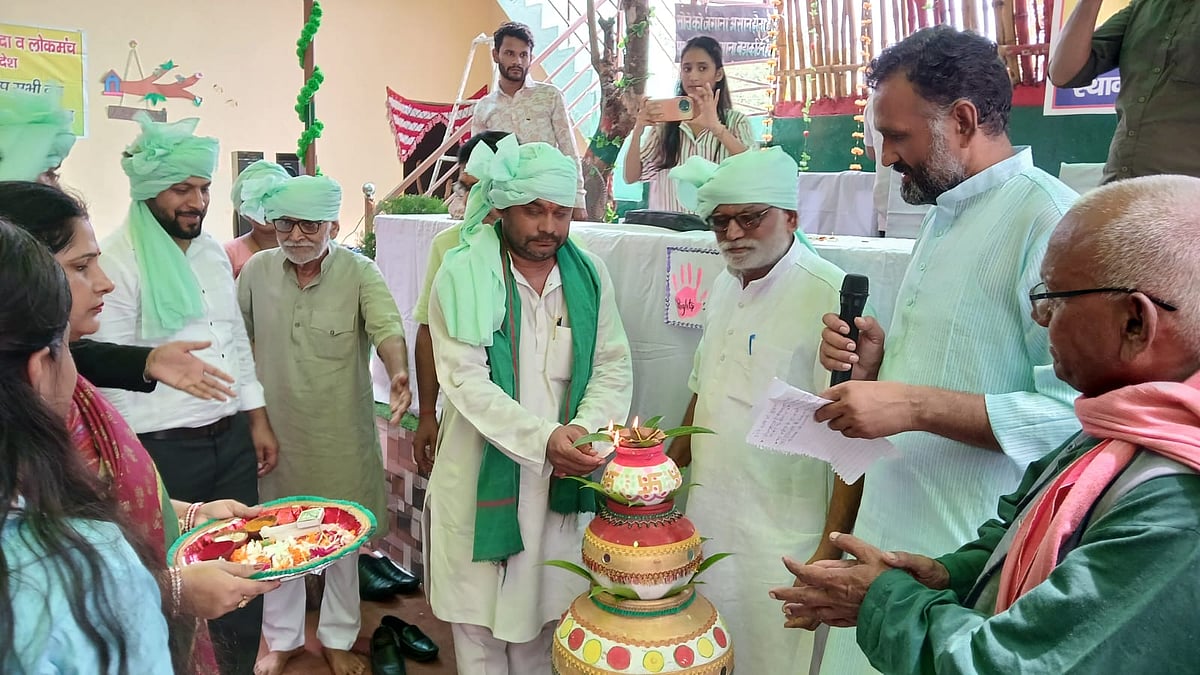Bundelkhand In Crisis: Drought, Debt & Farmer Suicides Deepen Distress
The event was chaired by District Bar Association President Dwarikesh Mandela, with former Rural Development Minister Daddu Prasad as chief guest. Presentations highlighted not only the agricultural and social challenges but also governance gaps, gender violence, poor infrastructure, and the plight of indebted families.

Lucknow: Bundelkhand continues to grapple with crippling agricultural distress and deep-rooted social challenges, from drought-hit farmlands and mounting farmer suicides to mass migration and lack of healthcare and education. Despite the presence of major rivers, irrigation remains scarce, soil fertility is poor, and repeated natural calamities have left farmers burdened with debt. Widespread poverty, unemployment, malnutrition, and the backwardness in girls’ education compound the crisis, painting a grim picture of the region’s struggle for survival.
These issues were brought into sharp focus at a state-level workshop organized by Vidya Dham Samiti, where teachers, social workers, advocates, journalists, public representatives, and members of the Chingari Sangathan came together to deliberate on solutions.
The event was chaired by District Bar Association President Dwarikesh Mandela, with former Rural Development Minister Daddu Prasad as chief guest. Presentations highlighted not only the agricultural and social challenges but also governance gaps, gender violence, poor infrastructure, and the plight of indebted families. Participants agreed on the need to strengthen advocacy through a network of like-minded organizations and called for urgent policy attention to Bundelkhand’s crisis.
Presenting a detailed report, Raja Bhaiya highlighted Bundelkhand’s multifaceted challenges. He pointed out that despite the presence of two major rivers, irrigation remains inadequate, leaving farmers dependent on uncertain rainfall. Repeated droughts, floods, and untimely rains have deepened the agrarian crisis, pushing farmers into debt. According to data shared, Banda district alone recorded 41 farmer suicides between April 2024 and August 2025.
The presentation also drew attention to social issues such as widespread poverty, migration in search of work, and poor access to education, particularly for girls. Health care facilities were described as inadequate, with malnutrition and diseases like tuberculosis on the rise. Administrative lapses, weak participation of women and Dalits in Panchayati Raj institutions, and exploitation of marginalized groups further aggravate the situation.
Gender-related problems, including a high incidence of crimes against women and limited economic participation, were also emphasized. The lack of infrastructure — poor roads, drinking water shortages, unreliable electricity, and absence of local employment opportunities — remains a major obstacle to development.
A case study of Village Naugava was presented to illustrate the ground reality. The village has a population of 2,408, with 1,748 bighas of land mortgaged and a cumulative debt of over ₹3.44 crore. A total of 491 villagers have migrated, 283 children are out of school, and 182 youths remain unemployed. “The very indebted farmers are often pushed to the brink, with suicides becoming a tragic escape,” the report noted.
Beyond agriculture and social distress, the workshop also discussed the condition of prisons, prisoners, and their families. Speakers argued that imprisonment affects not just the convict but entire families, often pushing them into despair and economic ruin. Suggestions included improving hygiene, food quality, and transparency in prisons, while establishing production units to provide meaningful work.
For prisoners, recommendations focused on mental and physical health, skill development, education, and creative activities. Detailed profiling and continuous counselling were suggested as measures to ensure rehabilitation. For prisoners’ families, proposals ranged from ensuring parents’ health care to providing employment for spouses and educational support for children.
Participants agreed that while Bundelkhand’s problems are deeply rooted, collective action and stronger advocacy can bring about change. “We want to create an environment where a person may go to jail as a culprit but comes out as a responsible citizen,” one of the speakers said, stressing the need for societal support to families of prisoners.
The workshop concluded with a call to strengthen coordination among civil society groups, legal experts, and community leaders to push for policy interventions and sustainable solutions for Bundelkhand.
RECENT STORIES
-
-
-
-
-